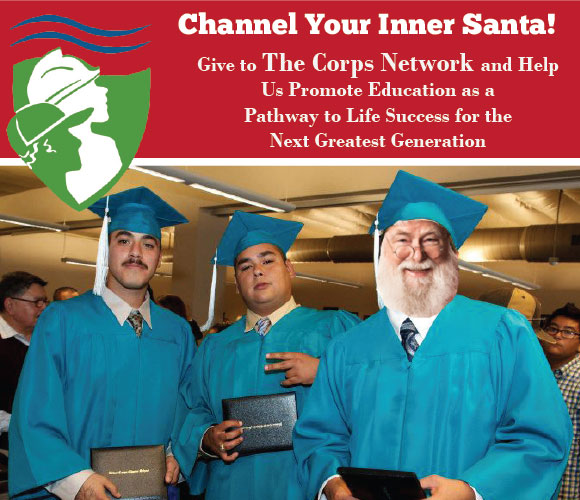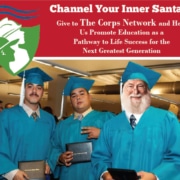Channel Your Inner Santa: Promote Education as a Pathway to Life Success

As participants in the Crowdrise Holiday Challenge, The Corps Network greatly appreciates your donation to support our work cultivating the “Next Greatest Generation” of Americans. Each week, we will highlight some of our 2013 accomplishments. This week we will focus on our education initiatives.
The Corps Network (TCN) continues to address critical needs in the American education system with the Postsecondary Success Education Initiative (PSEI). The PSEI promotes GED and Diploma achievement and guides participants in the college enrollment process. Helping Corpsmembers further their education is a focus for many Corps. For the large number of young people who drop out of high school, Corps can provide a vital alternative education opportunity. Corps help disconnected young people catch up in their studies and earn a GED or high school diploma. Some Corps operate charter schools and combine service-learning with workforce development opportunities. Other Corps programs employ dedicated teachers who help Corpsmembers gain marketable credentials.
 In 2013, Corps programs in The Corps Network achieved the following:
In 2013, Corps programs in The Corps Network achieved the following:
* Almost 5,000 students received a High School Diploma or GED while in a Corps (43% of Corpsmembers did not already have a GED/HSD)
* 30 days after completing time at the Corps, 67% of Corpsmembers were enrolled in an education program (college or high school)
Through the Postsecondary Education Success Initiative we have served 229 participants in the first year-and-a-half of programming.
* 72% of participants who needed a GED or HSD received one (many are still enrolled and working towards it)
* 72% of students have submitted an application to a postsecondary program; 40% have enrolled.
The Corps Network takes pride in our work connecting national service with scholarships through our AmeriCorps Education Award Program and the recently launched Opportunity Youth Service Initiative (OYSI). OYSI will engage low-income and urban youth of color in conservation service. Participants of OYSI are enrolled in academic programming designed to lead to a high school diploma or GED, as well as workforce development designed to lead to workforce skills and job opportunities. TCN is proud of the many opportunities that OYSI participants will gain, and is looking to further the reach of this initiative to provide opportunities to a greater amount of America’s youth.
Since the launch of our education initiative, The Corps Network and its member Corps have demonstrated a decreased need for developmental education and an increase in postsecondary enrollment and persistence. The Corps Network has fortified educational opportunities for many youth by partnering with College for America and other organizations that promote youth employment and opportunity. College for America provides online courses that allow Corpsmembers to pursue and earn an Associate’s degree enabling those students to pursue a greater number of careers and pathways to success. In addition, TCN is working with Corps by piloting Core Skills Mastery, an online adaptive-learning platform that is used to help teach Corpsmembers about problem solving as well as develop the skills that many employers seek.
Please support The Corps Network and help us give Corpsmembers the opportunity to have access to quality education and career success through our education initiatives.
Channel Your Inner Santa and give to The Corps Network.
Thank you!
The Corps Network


































































